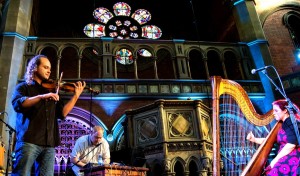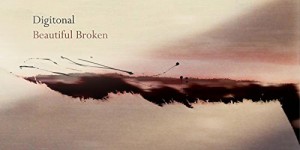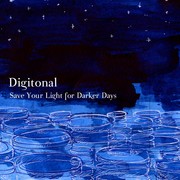Digitonal's Luxurious Melancholy.
Podcast: Play in new window | Download
Subscribe: RSS
 The music of Digitonal seems to luxuriate in melancholy, a bath of serene melodies and sublime sadness, dipped in minimalist cycles, haunting strings and even clarinet. With titles like Save Your Light for Darker Days, Beautiful Broken and “Wide-eyed Wrapped in Love,” it’s easy to read gloom into the sound of the band, but founder Andrew Dobson says that’s not necessarily the mood he’s going for.
The music of Digitonal seems to luxuriate in melancholy, a bath of serene melodies and sublime sadness, dipped in minimalist cycles, haunting strings and even clarinet. With titles like Save Your Light for Darker Days, Beautiful Broken and “Wide-eyed Wrapped in Love,” it’s easy to read gloom into the sound of the band, but founder Andrew Dobson says that’s not necessarily the mood he’s going for.
“I just reread Count Zero by William Gibson,” Dobson explains, “and there’s a wonderful quote toward the end of that, where the lead character confronts the maker of these pieces of art, which is actually an artificial intelligence. The art that this A.I. has been making makes her feel sad. And she asks him ‘why do you make art that’s sad’ and he replies ‘they’re not sad. They’re of time and distance and the sadness is within you as a listener.’ I love that quote and I’ve actually got it printed above my computer at the moment”.
Violinist Samy Bishai, Dobson’s partner in Digitonal, tries to obviate Dobson’s emotional melancholy. “I’d say expressive more than melancholic,” he avers, before reconsidering. “But actually, now that you mention it, there is some miserable stuff on there. It’s very much Andy’s musicality, his kind of musical character. Sort of heart-on-sleeve kind of thing. There’s no pretension, there’s no filters. It’s not trying to be anything that it isn’t. What you hear is what you get”.
 This is a sound that Andrew Dobson has been honing for nearly two decades beginning back in the 1990s when he first heard a confluence between the minimalist music of Steve Reich and the burgeoning techno and chill out scenes.
This is a sound that Andrew Dobson has been honing for nearly two decades beginning back in the 1990s when he first heard a confluence between the minimalist music of Steve Reich and the burgeoning techno and chill out scenes.
“The roots of this project came in the 1990s when I was a lot younger and more inclined to kind of go out and party and that kind of thing,” Dobson reminisces, “I used to go to a lot of clubs in London. And there were a lot of techno clubs, but there was also a culture of the chill out room in the after party. The first time I ever heard [Reich’s] “Electric Counterpoint” was at a kind of all back-to-mine kind of after party after a full on night of hard Detroit acid house, you know. And I remember going back to this guy’s house and he was playing The Orb and playing Future Sound of London and all of that kind of stuff, but he put on “Electric Counterpoint” and…wow. And the thing that I did with this project right from the beginning was immediately see the parallel of techno, repetitive electronic music, and phasing”.
He brought that into the early music of Digitonal and on his new album, Beautiful Broken, he composed an outright homage to Steve Reich called “Eighteen.” “Eighteen is obviously influenced directly from Steve Reich and Music For 18 Musicians,” he admits.
Andrew Dobson didn’t grow up plugged in. As a child, he studied classical music. His parents played a large role in shaping his music taste at young age.
“I grew up in a house which was purely classical and jazz,” he says “ So my mom was a big opera lover and a big early music lover and my dad only listened to jazz, particularly early jazz – everything from Dixieland type stuff to Louie Armstrong – but kind of stopped there. Although he’s well in his 80s now, he’s kind of suddenly got into bebop in a really big way, which is a hell of an age to kind of discover that”.
 Dobson studied clarinet, his influences went beyond classical music. But it’s hard to keep a young boy in the practice room when pop music is booming everywhere. Born in London in 1975, Dobson came of musical age at the tail end of the new wave and electro-pop.
Dobson studied clarinet, his influences went beyond classical music. But it’s hard to keep a young boy in the practice room when pop music is booming everywhere. Born in London in 1975, Dobson came of musical age at the tail end of the new wave and electro-pop.
“The thing that grabbed me was anything with a synth,” he recalls. “The first single I ever bought was “Voyage Voyage” by a French band called Desireless which was this kind of classical bit of French synth pop. And I got into the Pet Shop Boys and Depeche Mode. Something that almost makes me laugh actually, I’ve read interviews with other electronica guys and they talk about, you know, their earliest sense of electronic music. And everyone pulls out like a Kraftwerk or Delia Derbyshire or Can or whatever. But for me it’s not the cool stuff. It was Jean-Michel Jarre, and Kitaro and the kind of almost like the new age kind of side of things. Jean-Michel Jarre’s Zoolook album was a huge influence on me as a kid in terms of then wanting to buy a load of synthesizers and have a choir and an orchestra, and opera singers and stand up in a big massive stage with hundreds of thousands of people and belt out these rather simplistic, but kind of quite impactful kind of tunes”.
“Vangelis, Tangerine Dream, Kitaro,” he name checks., “It borders on the cheesy, for sure, in places, but you know, [Vangelis’] Bladerunner soundtrack is the greatest piece of electronic music ever written. And I think you’d be hard pushed to find an electronic project that wouldn’t cite it as an influence”.
Those influences all converged in Digitonal, which he began in 1997 and released his first recording in 2002. The early sound f the group was very much in the chillroom sound pioneered by The Orb and Future Sound of London, but Digitonal’s music changed in 2008 when Dobson began rediscovering his classical roots.
“My biggest background as a musician when I was a lot younger and I was more of a classical musician, was early music and Renaissance music, and polyphony and those have been my musical staples”, Dobson proclaims.
Dobson picked up his abandoned clarinet and though it’s not an instrument you hear much in electronic music, it’s become one of the distinctive sounds of Digitonal. As a lapsed classical musician, Dobson is self-effacing about his technique.
“I was never the technical guy,” he laughs, “I was never the virtuoso, you know. I’ve always kind of relied on the emotive connection of my playing more than my technique”.
But he gets the emotional power he needs, especially on the track “93 Years On” from the 2008 album, Save Your Light for Darker Days, which features an emotionally anguished clarinet solo, wailing through his electronic landscape.
“I came down to London to do a gig at a venue called 93’ East, which is where this title kind of derives from,” he remembers. “I came out on stage and my entire past was in this room. Two ex-girlfriends, friends that I’d fallen out with. And I got this emotional punch in the stomach from that gig. We finished the gig and I was supposed to be staying in London all weekend, and I couldn’t deal with it. And I got in the car and at 1 o’clock in the morning, I drove 300 miles back up to Sheffield. I got in, couldn’t sleep, absolutely buzzing, you know, head in pieces. And I wrote “93 Years On” basically end-to-end, apart from the clarinet part. “
“The day after, I was still a bit frazzled by the whole thing and I basically got drunk just sitting in my studio drinking whiskey,” he confesses . “And something was missing from the track and I had this clarinet that my sister had returned to me after years. And I thought, ‘I used to be able to play this. In fact at one point, I was pretty decent.’ And I hadn’t played it for about 10 years. I pulled the clarinet out and I was very, very drunk, and I did that entire thing in two takes”.
In the seven-year interval between Save Your Light for Darker Days and Beautiful Broken, Dobson went through a few life changes.
“Divorce, basically,” he clarifies, “You know, splitting up with my wife and children”.
It’s easy to read meaning into the music Dobson wrote. But he says much of that inspiration actually came from painters like Matisse, Miro, and Pollack. It seems to all swirl together.
“Being around beautiful things,” he muses, “And maybe I felt a bit broken, I mean I don’t want to post-rationalize it, but you relate to your response to that stimulus”.
The sound of Beautiful Broken matches the more introspective, intimate space that Andrew Dobson was occupying. It’s a little less epic and beat driven than previous Digitonal albums.
A lot of the earlier stuff we did was very much based on our mutual love of quite epic lavishly orchestrated, ambitious compositions,” elaborates Samy Bishai.
“I wanted to make that sound world smaller,” concurs Dobson. So I was much more careful which is why the beat production isn’t so dance based. It’s very minimal in in that sense. And then the violin playing is a little more muted. We don’t track up loads of stuff. It’s more of a traditional chamber sound, if you will”.
“As opposed to going to 64 tracks of overdubbed violins to emulate a massive string arrangement or something like that,” observes Bishai. We both felt the music of the record needed something…kind of ‘honest’ was a word that came up with all this”.
Beautiful Broken is an album that seems to have deep meaning for Andrew Dobson although he’s not quite sure what it is yet.
“Save Your Light, I love it, it’ll remain an incredibly personal album to me,” he proclaims, “It’s a real marker in my life and it was designed to be a marker in my life. Ironically, this album wasn’t designed to be a marker in my life, but it will become one. It will become a very important one”.
Andrew Dobson says that it won’t be another seven years until the next Digitonal release. Their latest album, Beautiful Broken is out on Just Music Records.
~John Diliberto
